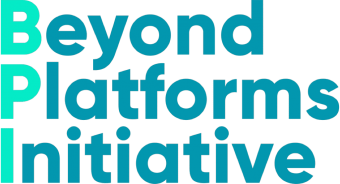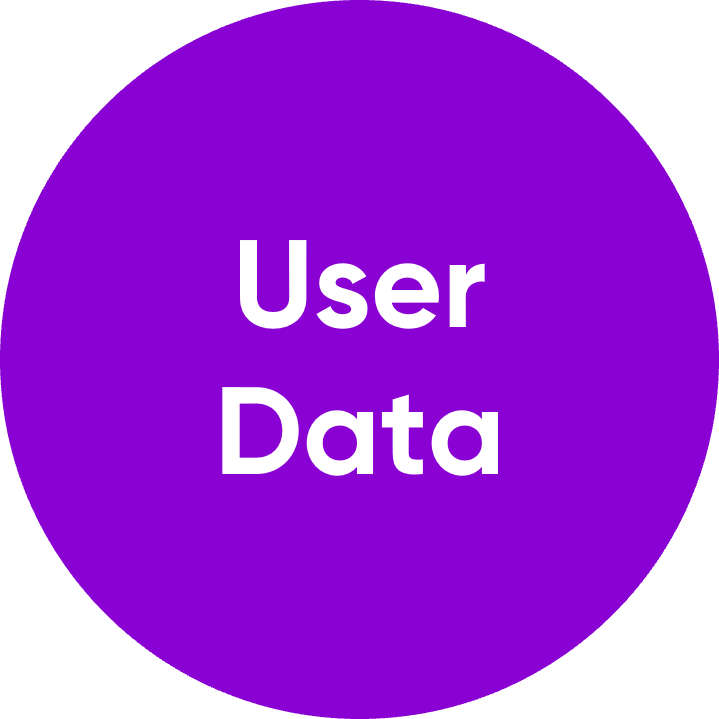
what do we want to achieve
The Beyond Platforms Initiative aims to renegotiate the rules for media consumption on the Internet. The aim is to build up alternative access and establish a media infrastructure of its own. Only in this way will there be a chance in the long term to turn social networks and platforms into a commodity and thus break their position of power. This is not about imitating large social media networks. Instead, we want to work on a media system and thus on media services that are based on standards, interoperability and decentralization. The most important thing in this context is that it is first and foremost about infrastructure, structures and the technology. We need to ensure the distribution of media in the digital realm in order to bring competition back to the content level.
To this end, we have spent the last few months working intensively on a concept that could be an initial vision for a new media ecosystem. We present this vision to you here.
Building blocks for a new media ecosystem

How does the digital present look like?
Large digital corporations are vertically integrated:
« They own user data
« They have the content
«They take over the distribution and develop the interface
This puts the control and power of the
digital public sphere in the hands of a few corporations.
Our Vision
The massive “vertical integration” can only be countered with cooperation, interoperability, decentralization and standards.
The world beyond the platforms separates the building blocks: User inside data, content and distribution.
In this way, we open up the market for players and enable content competition again. A world beyond platforms must be usable for users and providers, it must avoid intermediaries and still allow the use of content pools and the aggregation of reach – without transferring user data to third-party platforms.
The Beyond Platforms Initiative (BPI) building block system developed here lays the foundation for a new, more self-determined, decentralized content distribution ecosystem for the media and complements the existing platform world
Getrennte Bausteine und Rollen




The BPI ecosystem
We see a key element in the integration and want to separate the system into four building blocks. Content Owner, Registry, Broker and User Data.
Afterwards, all the building blocks are explained. Their interaction creates the new world beyond the platforms. All content remains with the providers (content owners). Only the metadata of the content pieces is recorded centrally in a registry. In this way, the content can be played out in a standardized world in all networked interfaces of current and future providers (brokers). This interaction can integrate all current players and does not force anyone to abandon their own offerings.

Content Owner
The content owner does not transfer his content to a third-party platform, but “only” the metadata about the content to the registry. From the registry, on the other hand, the business rules for the use and exploitation of the content can be retrieved.

Content Owner motivation:
+ Acquisition of new users at lower prices (broadest possible technical coverage for own content)
+ Control over distribution and own content
+ Freedom and flexibility in business models
+ Lower revenue share
+ No transfer of content and rights to third-party platforms
+ More direct data extraction
Registry
The Registry is the central building block in a new distributed media ecosystem. The Registry is a unique and independent public good entity.

+ It represents a catalog of all content and stores all metadata (“meta-information”) of this content. The metadata is very comprehensive and includes different categories, for example:
« Content metadata (title, description)
« Technical metadata (formats)
« Metadata about business rules
(i.e. via permitted forms of exploitation, etc.)
+ It is open to all who accept the registry’s terms and conditions.
+ It ensures content and broker access.
+ It can enforce the T&Cs and exclude content owners and brokers through them.
Registry necessity:
+ Standardized metadata models and exchange formats
+ Consideration of the respective utilization models by the deposited business models
+ Easy integration into the ecosystems of brokers through public and standardized interfaces (“API”: Application Programming Interfaces)
+ Best of breed technology stack with the use of (preferably) open source components
Broker
Brokers act as intermediaries and compile content offers for users based on metadata from the registry. Core functions of a broker:
+ User Experience
+ Matchmaking & Algorithms (e.g. content selection)
Can be developed by a content owner or an entity completely independent of the content owner.

Broker motivation:
+ More attractive offer, because of access to a larger quantity and better content
+ Elimination / minimization of market entry barriers,
as content and user data are directly available (expansion of own content or development of a new content offering)
+ Opportunity to focus on catalog segmentation, UX, and matchmaking in value creation (competition of algorithms)
User Data

User data is stored in the user data safes:
+ Login & profile (usage data, histories, etc.)
+ This data is available to all brokers and content owners after authorization
+ The users can decide about the use of their data and
transfer their data to the brokers and content owners at any time.
+ This is where the billing and settlement takes place
+ Bundling can also take place in this entity
User Data motivation:
+ Users can in principle use all content of the ecosystem in one app (Broker).
+ Users can easily switch apps (Broker) without any losses.
+ Users tend to get cheaper access to a larger catalog (bundling).
+ There is now an alternative to large platforms, so that content can be played out exclusively via this ecosystem.
Relationships and operating principles in the BPI ecosystem

Advantages of the solution for society
+ Digital public space for opinion forming
and information exchange
+ Strengthening pluralistic societies with
with a free democratic basic order
and European cultural diversity
+ No concentration of power in a few
few companies
+ Competition at the level of brokers, user:inside profiles
and content owners is strengthened
+ The registry can be used to enforce targeted and verifiable
compliance with rules (diversity) can be enforced
+ Better enforceability of legal requirements
+ Revenues remain in Europe
+ Strengthening Europe in the areas of market,
business models, technologies and innovations
Here again at a glance.
For questions, feedback and suggestions you can find the mail of our contact person on our About Us page.
The Beyond Platforms Initiative is a network of media experts and media makers who know and use the rules for media consumption on the Internet.
Their working contexts are private and public media and technology production. For more than a year, the initiative has been supported in its project by the location initiative nextMedia.Hamburg, the Hamburg Kreativ Gesellschaft and the City of Hamburg. In addition, the BPI is networked with European movements and scientific institutions.









